Bakfiets & Bakkersfiets: etymology
TweetThis morning, for the first time, I found a reference to the box of a Bakfiets Cargobike as the “bucket”. “Bak”, “box”, “bucket”… I’d just never thought of that connection before.
The usage of these Dutch words is a constant source of confusion for English speakers and even with Dutch being my second language it’s amazingly irritating to constantly read about a “bakfiet” or an “omafiet”. Thus I’ve decided to set it down in electrons, once and for all. I’m no pro in the world of etymology, but here’s at least an overview of the correct usage and some of the most obvious Dutch-English language connections surrounding our beloved fietsen en bakfietsen:
Bak (pl: bakken)
Translation: Tray, pan
Related English words: Box, bucket
Bakken
Translation: To bake
Related English words: Baking
Bakker (pl: bakkers)
Translation: Baker
Related English words: Baker
Fiets (pl: fietsen)
Translation: Bicycle
Related English words: none, roots disputed
It’s critical to note that “fiets” is the singular form thus “fiet” is not a word. Nor is there an “omafiet”, “opafiet” or a “bakfiet”, for that matter. One fiets, two fietsen. Please remember this and 25 million Dutch speakers worldwide will thank you.
**Update 21-02-2012: A pair of Belgian linguistics professors (Yes, Flemish and Dutch are very close cousins) claim to have figured out the mysterious origins of the word “fiets”. It seems that when the bike was first invented Germans called it “vice-pferd”, meaning “replacement horse”. This was shortened to Viez, pronounced in English or Dutch as “fiets”.You can read the article here.
Gebak
Translation: Pie, as in “baked in a pan”. A pan is, after all, also a sort of box. So the “bak” refers to the process of baking but the Dutch word “bakken” for baking stems from the same roots. Confused?
Related English words: none
If you visit the Netherlands it’s important to know about gebak since you’ll spend much time in cafes here and appelgebak is almost universally the only treat available in a Dutch cafe.
Gebakken
Translation: Baked, fried, sauteed (it’s all the same, dutch is not a language of cuisine, just like English only has one word for snow.)
Related English words: none
Thus some of the myriad combinations we can make with the above words…
Bakfiets (pl: bakfietsen)
Translation: tray bike, box bike, bin bike, bucket bike; The bakfiets traditionally has 3 wheels but plenty off Dutch refer to heavy-duty two wheelers as bakfietsen too. Bakfiets is a subset of “transportfiets“
Related English words: none
Again “bakfiets” is singular and “bakfiet” doesn’t exist, not even in Dutch fairy-tale land. Bakfiets also happens to be the name of the company that made the bakfiets popular again as a family vehicle, but anybody can legally call their pedal-powered load carrier a bakfiets.
Bakkersfiets (pl: bakkersfietsen)
Translation: Baker’s bike, subset of “transportfiets”
Related English words: none
Baker’s bikes (and similar butcher’s bikes) were once very common throughout northern Europe, generally ridden by the baker’s or butcher’s son. Archive photos from the 1930 though 1960’s show swarms of them on the streets of Amsterdam, all the boys in neat white jackets.
(photo from transportfiets.net)

|

|

|

|
Transportfiets (pl: transportfietsen)
Translation: Transport bicycle, carrier bicycle, freight bicycle
Related English words: none
Transportfiets is the umbrella term for all load carrying bikes, particularly those intended for commercial use. In principle classic and modern bakfietsen, baker’s and butcher’s bikes and industrial bikes all fall under this heading. But in “street terms” the Dutch think of the classic baker’s bike when they hear “transportfiets”.
In this post I wrote all about my own, lovely old Yankee bakkersfiets.
Thus you should now understand clearly that the bakker (or at least the son of the bakker) rides a bakkersfiets, which could be but is not necessarily a bakfiets. It could even be a fancy “banketbakkersbakfiets” with a display if we’re talking about a pastry and cake baker. Regardless it is definitely a transportfiets. There is certainly a bak on either a bakkersfiets or a bakfiets, and its quite likely that gebak will be transported in or on the bak of the bakker’s fiets. That gebak will, in any case, be loaded on TOP of the bak to make sure it doesn’t get smashed.
But really all I want you to remember from this lesson: THERE IS NO FIET, BAKFIET OR OMAFIET!!! Thank you.

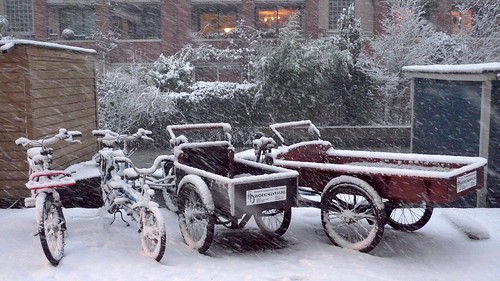
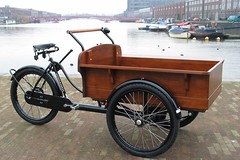
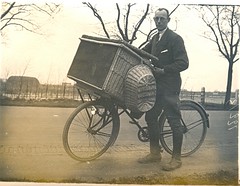
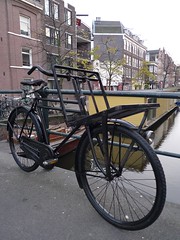
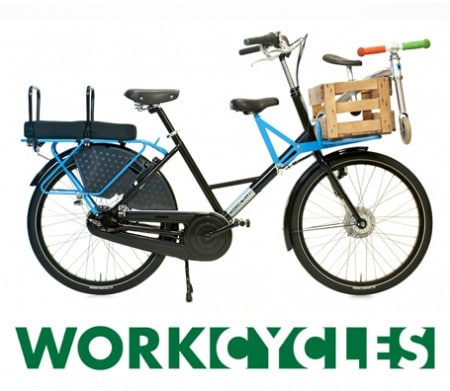
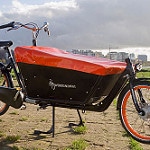















September 4th, 2007 at 18:26
So you call it a “box” rather than a “bucket” ? “Box” is probably a more attractive word, and makes more sense, since “buckets” are often round, but “boxes” are square.
September 4th, 2007 at 18:45
Actually we call it a “bak”, but I suppose “box” is the most common and direct translation. 😉
September 5th, 2007 at 23:55
Very cool. So what does “en meer” mean?
jsn
September 6th, 2007 at 00:47
“en meer” just means “and more”, but its also a pun: “bakfiets” + “en” = “bakfietsen”, which is both the noun described above but also the verb for riding a bakfiets. Thus “bakfietsen meer” also means “more bakfiets riding”.
-Henry
December 7th, 2007 at 05:59
[…] the etymology of the word bakfiets is better explained by someone who uses the word etymology more often than I do. Suffice it to say […]
July 17th, 2009 at 07:40
[…] Here’s more (humorous) bakfiets etymology Thanks Iam sterdam for the great photo! Click to your heart’s content: […]
August 18th, 2009 at 22:25
[…] In case you’re confused thinking that a bakfiets is a modern, two-wheeler that mom carries her kids in, you’re half correct. That’s a Bakfiets Cargobike, with Bakfiets being the very generic trade name for Maarten van Andel’s brilliant bike. But to Dutch folks “bakfiets” still generally means a giant, heavy duty three-wheeler with a wooden box on the front, a brake lever between your legs and a fixed gear to keep those legs busy. Just to be sure: “bakfiets” is singular and “bakfietsen” is plural. Please remember that as it’s quite painful to read “bakfiet”. Check here for a more detailed description of the etymology of bakfietsen, bakkersfietsen, bakkers, … […]
March 24th, 2011 at 22:12
I once had the idea of selling books out of a bakfiets, or maybe a bakbrommer, as a kind of mobile mini-bookstore. Some friends thought it was a really cool idea, others thought I was joking or maybe nuts. I was going to call the business The Book Bin. Then if I got the bakbrommer, I had the idea of calling it a boekbakbrommer. But then one of my friends from Holland (who is actually from the part of the Netherlands called Holland) said that sounded like I would be baking books while humming a happy tune.
October 5th, 2011 at 08:27
mutui…
[…]Bakfiets en Meer » Blog Archive » Bakfiets & Bakkersfiets: etymology[…]…
February 26th, 2012 at 19:02
OK then: boxvice it is, and grannyvice, cityvice, and so on. Vice cops and bicycle cops are now synonymous.
February 27th, 2012 at 12:57
@Todd: Ha, so you read about this Belgian professor who claims that fiets is derived from German Vize, as Vize-Pferd = substitute horse. Apart from the fact that no German in his right mind would call a Fahrrad a Vize-Pferd, the use of vize in this meaning is virtually unknown in Dutch, plus this use of Vize- in German is actually younger than the word fiets. A bad case of popular etymology.
February 28th, 2012 at 04:09
Frits (Fritz?), “vice” is old Latin, liberally deployed in most modern European languages now as in centuries past; exampli gratia, “vice versa.” It seems you are the one introducing “vize” to the discussion as dubious Dutch or German usage in the 19th century. I’ll take your word for it.
February 29th, 2012 at 16:14
@Todd: Vice is the ablative of vicis which is the basis for German Wechsel and Weiche, Dutch wissel, and simply means change, as in change of seasons and a change in fortune. This has evolved to “in lieu of”. What I referred to was the somewhat strange postulation of two professors in Gent who recently suggested that the word “fiets” might be derived from German Vize- as in Vize-Pferd, seeing a bicycle as a replacement for a horse. The general assumption is that fiets derives from vélocipède, a word coined in 1867 when the first actual bicycle was presented in Paris. The word fiets dates back to 1870/1871 (oral history – 1870 in Deventer or Apeldoorn, 1871 in Leeuwarden) and appears in print for the first time in the Arnhemsche Courant of 28 April 1886 (practically all old Dutch newspapers are in a central database nowadays – it’s a small country). The only place where a German word “fits” was found by the two professors to be used for a Fahrrad was in Wipperfürth, some 80 km east of the Dutch border, some time before 1931. The term Vize-Pferd doesn’t come up anywhere at all, not even in a jocular sense. It can be safely assumed that the suggestion Vize > fiets is mere speculation.
The same situation is known around the word kiek for photograph, although it’s hardly used nowadays. Origin unknown, although there used to be a photographer by the name of Israel David Kiek (1811-1899) in Leiden who is supposed to have been immortalized this way.
Enough pedantry for the day …
April 13th, 2012 at 21:36
I briefly lived in hope the word ‘fiets’ would turn out to be so typically Dutch that it needed no explanation. The etymology given here does not deeply satisfy. I believe ‘fiets’ is the oer-Hollandse root of the whole Dutch language. AFter all, on a ‘fiets’ you can go in any direction you want.
April 22nd, 2012 at 05:40
Tiffanys Treasures…
[…]Bakfiets en Meer » Blog Archive » Bakfiets & Bakkersfiets: etymology[…]…
April 28th, 2015 at 01:36
Titel 12. Een stokpaardje op wielen. (over de uitvinding van de fiets) : “Dagelijkse Dingen en hun Geschiedenis”. / Een luisterspel door Frank Leberecht, ; uit het Duits vertaald door Georgette De Rijcke.
Auteurs Frank Leberecht
Georgette De Rijcke
Uitgever Brussel : Belgisch Nationaal Instituut voor Radio-omroep, 1959
Collatie 27 p. ; 30 cm
Annotatie Description provisoire = Voorlopige beschrijving. Gestencileerd
Boeknummer 9 A/2010/5.211/1.405 (Magazijn – Algemene Leeszaal)
besten
ik ga dit nog natrekken,
wel even, geduld natuurlijk , tenzij je het zelf kan opsporen
groeten
April 28th, 2015 at 01:38
oeps ,
mijn eerste tekst is niet doorgekomen
opnieuw typen dus
em
April 28th, 2015 at 02:08
new try
this theory is wrong:
Related English words: none, roots disputed
It’s critical to note that “fiets” is the singular form thus “fiet” is not a word.
One fiets, two fietsen.
the singular is wrong
the plural is good tranlated in dutch prononciation
i will explain
1 voet = 1 foot
2 voeten = 2 feet
BUT
nowadays everyone speeks english (except me) 🙂
in the 18 century people spoke not so good english
so they translated :
1 voet = 1 feet (wrong dutch translation)
2 voeten = 2 feets (wrong dutch translation)
so, if :
1 voet = 1 feets = 1 fiets
2 voeten = 2 feets = 2 fietsen
1 voet + 1 voet = 2 voeten
1 feet + 1 feet = 2 feets = plural in dutch = 2 fietsen
if 2 fietsen = 2 feet
1 feet = 1 fiets
it seems a little ridiculous , but
dutchpeople will allways a plural with an S for many english words
as in:
table = tableS
sun : sunS
bed = bedS
car = carS
son = sonS
girl = girlS
and so on
but feet is an irregular plural for duchtpeople
nowadays there is a same exemple
1 scampo = 1 scampo
1 scampo + 1 scampo = 2 scampi
BUT:
dutchspeaking people say : 2 scampiS (with S)
in my opinion the word feet comes from the time the little tyre from the penny farthing was 1 foot an the great tyre was 4 feet
in holland the tires were in feet, in Belgium and france in centimeter
sellers must make the difference
dutch tyres from england imported were in feet = feets = fiets
belgian and french tyres were in centimeter and called vélo
January 16th, 2024 at 15:43
Breakup Relationship Support
Bakfiets en Meer » Blog Archive » Bakfiets & Bakkersfiets: etymology